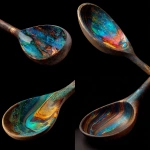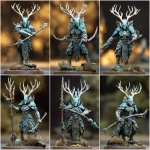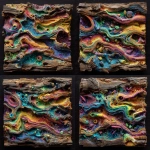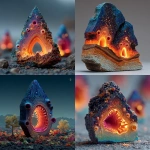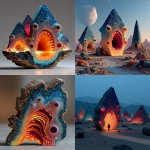Explore the Best AI Image Gallery
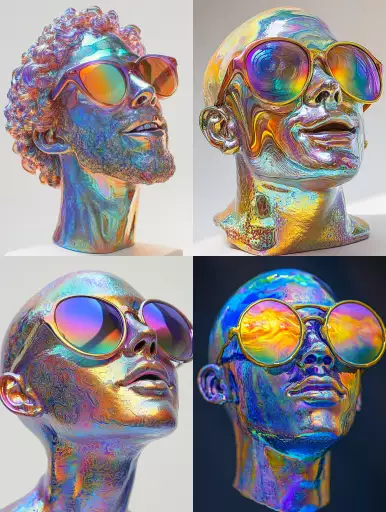
Fashioning the Future: How Wearable Tech is Redefining Creative Expression
Wearable technology has emerged as a powerful catalyst for innovation, blurring the lines between physical and digital realms. Its impact on the creative industry is profound, empowering artists, designers, and innovators to explore uncharted territories and redefine creative expression.
A New Canvas: Wearables as Artistic Tools
Wearable tech has introduced a dynamic new canvas for artistic exploration. Devices like smart glasses, haptic gloves, and motion-tracking sensors enable artists to translate their thoughts and movements into tangible creations. Imagine a painter wielding a virtual brush controlled by hand gestures or a musician composing melodies with the rhythm of their heartbeat.
- Interactive Installations:
- Performance Art:
- Personalized Art Experiences:
Wearable tech facilitates immersive and interactive art installations. Visitors can don sensors that react to their presence, triggering light shows, sound effects, or even altering the physical environment.
Performers can leverage wearable technology to enhance their stage presence. Sensors integrated into costumes can translate movement into captivating visuals projected onto screens or create synchronized lighting effects.
Wearables allow for personalized art experiences tailored to individual preferences. Imagine an artwork that dynamically changes based on the wearers heart rate, emotions, or even their surroundings.
Reimagining Design: Wearables in Fashion and Beyond
The fashion industry is embracing wearable tech, integrating it into clothing, accessories, and footwear. Smart garments can monitor health metrics, adjust temperature based on the wearers needs, or even display interactive elements.
- Adaptive Clothing:
- Fashion-Tech Fusion:
- Personalized Style Expression:
Wearable sensors in clothing can detect changes in body temperature, posture, or movement, automatically adjusting fabric tension or ventilation to provide optimal comfort.
Innovative designers are blurring the lines between fashion and technology, creating garments that incorporate LEDs, interactive displays, or even haptic feedback mechanisms.
Wearables allow individuals to express their style in new and innovative ways. Imagine clothing that changes color based on mood or environment or accessories that project personalized animations.
Ethical Considerations: Navigating the Uncharted Waters
The integration of wearable tech into creative industries raises important ethical considerations. Data privacy, user consent, and the potential for bias must be carefully addressed.
- Data Security and Privacy:
- Algorithmic Bias:
- Accessibility and Equity:
Wearable devices collect vast amounts of personal data. Robust security measures and transparent data usage policies are essential to protect user privacy.
AI algorithms used in wearable tech can perpetuate existing biases if not carefully designed and monitored. Its crucial to ensure fairness and inclusivity in the development and deployment of these systems.
Access to wearable technology should be equitable, ensuring that individuals from diverse backgrounds and socioeconomic levels can benefit from its creative potential.
Future Trends: Shaping the Creative Landscape
The future of wearable tech in creative industries holds immense promise. Advancements in areas such as artificial intelligence, augmented reality, and biofeedback will continue to push the boundaries of creative expression.
- AI-Powered Creativity:
- Immersive Storytelling:
- Collaborative Creations:
AI algorithms will increasingly assist artists in generating ideas, composing music, or creating interactive experiences.
Wearable tech will enable immersive and personalized storytelling experiences, transporting users to new worlds and engaging their senses on a deeper level.
Wearables will facilitate real-time collaboration between artists, designers, and individuals from different disciplines, fostering innovation and cross-pollination of ideas.
Conclusion
Wearable technology is transforming the creative landscape, providing artists, designers, and innovators with unprecedented tools for expression. By embracing its potential while navigating ethical considerations, we can shape a future where creativity knows no bounds.
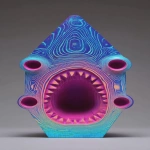
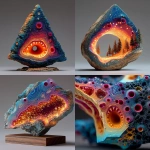

](https://images.ai-img.art/thumbnails/150/ebc95932b25c17607076ed8d2a4bafc85c3371cf3f2d45c35741505fe3c97de1.webp)
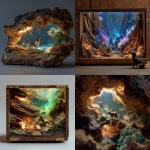
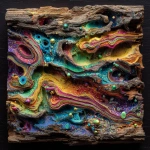
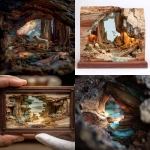
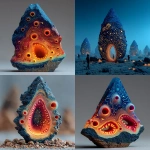

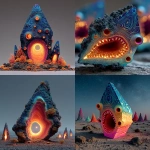
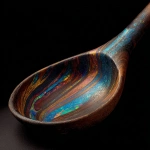
](https://images.ai-img.art/thumbnails/150/98325fa7102e81df81f1dba6df8df52929b4fa41b058192faf3c77cf94513ff7.webp)
](https://images.ai-img.art/thumbnails/150/914cb18c03c97bdba2f290c0ec1573d5792bf399dbad7f484614764eb31f4c2f.webp)
](https://images.ai-img.art/thumbnails/150/7d9de60c58579b921ad140a9e1d752642452d5086b74a27d866e8af04608ed7d.webp)


](https://images.ai-img.art/thumbnails/150/a31f622763ce0ecb2e76a907e566b81cfcc171e8d9b8b393f27681be24b6ca91.webp)

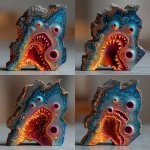

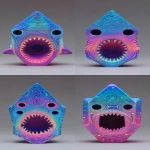

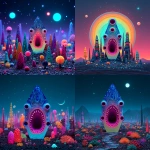
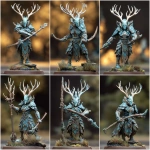
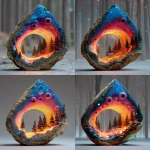
](https://images.ai-img.art/thumbnails/150/09314c003088f7174f747fa65105eca599e0842cf69e637ce4c98ebefd3f50ab.webp)




](https://images.ai-img.art/thumbnails/150/ac7218edd6198d49ed8d9853a5890595fc4d2a7a11c2e8a7ee8bcfbc7bfe265e.webp)




](https://images.ai-img.art/thumbnails/150/769518185300fcbda91b7bbf92b9007bc856379accd52eaf7983f9aec379e88e.webp)



](https://images.ai-img.art/thumbnails/150/3b65287fef447a6ad61bcb18b5b9d03b6f6f74603ae0e058f81f4b91a3e02f36.webp)
